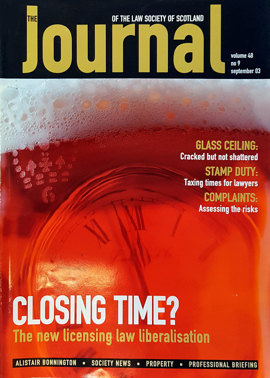The truth is a terrifying commodity
The inquiry presently being held in London by Lord Hutton into the circumstances surrounding the death of scientist Dr David Kelly has drawn nothing but praise from the media. The spectacle of lawyers being acclaimed across the media spectrum should give us pause for thought.
The reason is simple. As The Sunday Times noted in a recent leader, “Lord Hutton is trying to get at the truth”. That obvious point should remind us in the legal profession that normally finding the truth is not what we are about.
Our court system is built on the proposition that having parties taking up opposing positions and fighting with each other in the courtroom will produce justice. But few would claim that our system is a process for arriving at the truth.
I well remember listening to a radio broadcast some years ago in which the interviewees were the then Lord Chancellor and an investigative journalist. The righteous hack was absolutely adamant that a recent criminal trial had not arrived at the truth. The Lord Chancellor was totally baffled at the line being taken. “Our system is not aimed at arriving at the truth”, he said incredulously.
We lawyers know the Lord Chancellor was right. But is it really good enough for a legal system in the 21st century to tell the citizens of a democratic country that our system is not geared to discovering what actually happened?
This is not to say that the techniques of examination and cross-examination are not tremendously valuable. Lawyers are much better at assessing the reliability of evidence than any other profession. When things go tragically wrong anywhere in the world, who are the people called in to find out what happened? It is the lawyers.
But it is worthy of note that when lawyers have been brought in to help politicians deal with calamities in recent years – in cases such as Dunblane and Piper Alpha, for example – they have been given an investigatory remit.
Procedurally the Hutton Inquiry has gone further than the inquiries we have known in Scotland. In Hutton, cross-examination has not been permitted. That is the reason the investigation is moving at what newspapers describe as “a cracking pace”.
Speed alone, of course, is no virtue. But our court system in Scotland not only suffers by allowing interminable cross-examinationand re-examination, but fails to allow written evidence to be lodged before the start of proceedings.
This has to change. In court, we are starting to move from the confrontational to the investigatory. The options hearing in civil procedure and the preliminary hearing in summary criminal cases are both hearings where the judge is given an interventionist role. Intervention by the judge is now very much encouraged in cases involving children and generally in family matters. It will be amazing if Lord Bonomy’s recent report on High Court delays does not result in something similar to the English interventionist “hearings for direction” being introduced in solemn criminal cases.
It seems we are experiencing a shift from the days of pretending that kicking each other hard in courtrooms may, by some magical process, be sufficient to find truth and to do justice.
No-one would suggest that we should move from the confrontational to the investigatory overnight. But the seeds of change are there and, if we remember that we ultimately serve and are accountable as a profession to the public, we must take their views into account. Clearly, the public would prefer the truth to anything else.
But the truth is a terrifying commodity. Can we stand more of it?
In this issue
- The truth is a terrifying commodity
- Last orders for drinks licences as we know them
- Inside the Nicholson Report
- The room at the top
- To protect and serve
- All change for stamp duty
- Get an honest day’s work for an honest day’s pay
- Facing up to threats of action – and learning
- How to make other people run your IT smoothly
- Client care goes live
- Praise on anti-money laundering efforts
- Sheriff’s notes not recoverable
- Restoration or castles in the air?
- Marquess of Queensberry rules
- Website reviews
- Book reviews
- Conveyancers asked to order early reports






